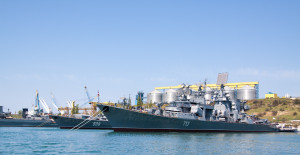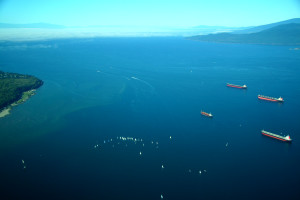Russian Warships Exercise in English Channel?
This past week, Russian warships entered the English Channel on their way to conduct anti-aircraft and anti-submarine military exercises in the North Atlantic Ocean. The English Channel is mostly international waters, and it is not unusual for Russia’s military to cross the Channel. However, given the tense relations between Russia and the West, it is impossible not to perceive these exercises as a Russian power gesture toward the Atlantic alliance. The exercises’ proximity to the United Kingdom has worried London, seeing as how it is not the first time in recent months that Russian military assets have gotten too close to the shores of Great Britain. On numerous occasions, the Royal Air Force (RAF) has scrambled to intercept Russian bomber jets (which usually fly with their transmitters off); eliciting attention from British Prime Minister David Cameron. Russia, effectively, is signaling that it has the capacity to exert force on the high seas in a bid to force the West to respect its interests.

The military exercises themselves are not too significant; however it is the atmosphere they create in Europe. Since Minsk II, the heightened sense of tension between Russia and the EU has continued to simmer. Soon after the P5+1 and Iran announced a nuclear deal, Russia lifted the ban on the sale of the S-300 Missiles that it had cancelled in 2010. Controversy then sparked over the plans of a Russian motorist group to cross Poland to celebrate the Red Army’s victory march in WWII, and the Belarusian President announced that he would not be in Moscow on May 9 for the 70th anniversary of the Allied victory over Nazi Germany. In this context, Russia’s military exercises appear to feed into the general sense of insecurity in Europe; Russia is flexing its muscle to let the world know that it can fight beyond its immediate borders and is a force to be reckoned with.
Russia’s heightened militarization continues to be demonstrated for the world to know. Russian bomber jets have flown as far as the Caribbean in order to make their presence known, tying in with Moscow’s global narrative that the world is unstable, and requiring Russia to amplify its capabilities worldwide. These exercises themselves do not increase the likelihood of war, as both the West and Russia have mutually deterred each other through their nuclear arsenals. Nonetheless, the exercises are significant because they are crossing through regions of clear importance to the United Kingdom and other nearby countries. The British Defense Ministry clarified that the ships did not conduct exercises inside the Channel, but the tension was evident. In any event,it is unlikely that Russia and the West will clash in direct war in the near future, but Russia is not going to let its guard down.
Russia’s military exercises in the Arctic, its jets patrolling the world, the conflict in Ukraine, and the newest naval exercises in the Atlantic Ocean all paint an image of insecurity and readiness. In this environment, it is impossible to maintain a “calm” and “normal” atmosphere because at any moment, a Russian bomber with its transmitter off could crash into a civilian airplane, setting off an international incident more consequential than the downing of MH17. The possibility that a Russian naval ship or jet could venture too close to another country’s territory could trigger a reaction from the threatened country that, if cool heads do not prevail, could spiral into a confrontation that all parties would be best advised to avoid.
For Moscow, the solution is simple: if the West stopped trying to “contain” Russia, Russia would not need to bolster its security. For the West, the solution is equally simple: Moscow ought to stop violating the sovereignty of small and large states alike and abide by “international norms.” The two sides are betting on the other to back down, and it’s most probable that one will, though it’s unclear who will take the definitive step first, and under what circumstances.

